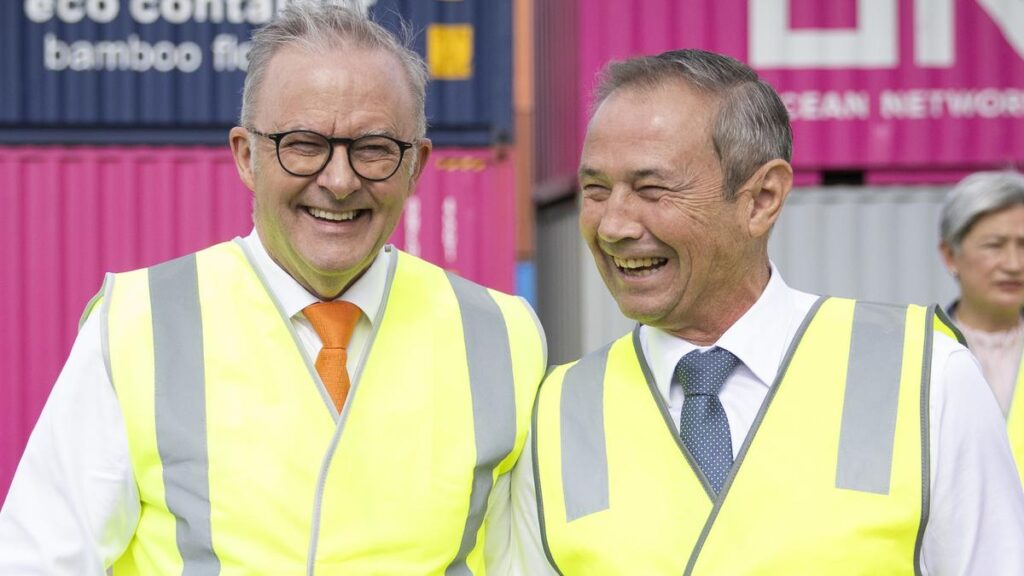
PERTH, AUSTRALIA - APRIL 24: Australian Prime Minister Anthony Albanese and Western Australian Premier Roger Cook visit the CBH Group Metro Grain Centre on April 24, 2025 in Perth, Australia. The Australian federal election is scheduled to be held on May 3, with a broad range of polls indicating a narrow lead for Labor on a two-party preferred basis. (Photo by Matt Jelonek/Getty Images)
Australia’s rare earths industry is set to play a crucial role in upcoming negotiations regarding critical minerals, with Prime Minister Anthony Albanese scheduled to meet with U.S. President Donald Trump on October 20, 2023. This meeting is anticipated to focus on the establishment of a $1.2 billion strategic reserve of critical minerals, a move that could enhance relations between Australia and the U.S., particularly in light of recent tensions with China over rare earth access.
The backdrop to this meeting is a renewed trade conflict initiated by Trump, who recently announced a 100 percent tariff on certain imports from China due to the country’s tightening export restrictions on rare earth minerals. China currently dominates the global supply and processing of these critical materials, which are essential for manufacturing a range of products, from smartphones to electric vehicles and military technology.
Roger Cook, the Deputy Premier of Western Australia, emphasized the state’s strategic importance in the global supply chain for rare earths. He stated that Western Australia has been attracting international interest as countries seek to enhance their mineral supply chains. “Critical minerals remain a key focus for my government. We understand the important role that it plays for not only regional security, but for sovereign manufacturing capabilities right across the globe,” Cook remarked.
The discussions surrounding the strategic reserve have been ongoing, with Catherine King, a Federal Minister, confirming that talks about a U.S. critical minerals deal have been on the agenda for some time. Recent reports indicate that the Federal Government has begun reaching out to Australian miners to establish the reserve, suggesting that preparations for a significant partnership with the U.S. are underway.
King referred to Western Australia as the “critical mineral State” of Australia, highlighting its essential role amid rising global demand for rare earths. “We have an abundance of wealth here in this nation, and we should be benefiting and capitalising on that. WA is critical to that future,” she stated.
In addition, Don Farrell, the Federal Trade Minister, discussed Australia’s potential as a reliable supplier of critical minerals. He noted that discussions with the Trump administration are ongoing and described the current landscape as a “golden age for critical minerals.” Farrell pointed out that Australia possesses vast resources that are vital for global decarbonisation efforts and technological advancements, though he acknowledged the need for financial resources to extract these minerals.
While the government appears to be moving forward with these initiatives, criticism has emerged from the opposition. Julian Leeser, the Shadow Attorney-General, accused the Albanese Government of delays in presenting a comprehensive critical minerals plan despite promises made during the recent Federal Election. “The government’s been talking about a critical minerals plan for months… less than two weeks until they see the President, there’s still no plan on the table,” Leeser said, questioning the lack of transparency regarding the government’s intentions.
Albanese previously highlighted the proposed strategic reserve as a means to assert Australia’s position in the global market, aiming to reduce reliance on China’s dominance in the sector. The strategic reserve would involve the government purchasing key minerals, such as lithium and cobalt, to create a stockpile and provide priority access to allied nations.
As the October meeting approaches, the developments surrounding Australia’s rare earths sector and its strategic partnership with the U.S. could significantly impact both nations’ economic landscapes and their responses to global supply chain challenges.






